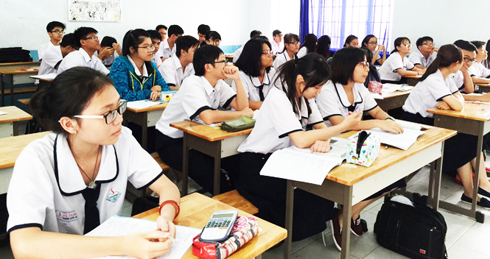Currently, there are instances where teachers treat students unfairly for reasons such as Student A attending extra classes while Student B does not, or Student A being well-behaved and obedient while Student B performs poorly. This causes psychological harm to the students. However, according to current regulations, this is one of the behaviors that teachers are prohibited from engaging in.

Illustrative image
To be specific, according to the regulations in Circular 06/2019/TT-BGDDT which stipulates codes of conduct in preschool education institutions, general education institutions, and continuing education institutions, officially effective from April 12, 2019, for students, teachers must:
- Use standardized, easy-to-understand language, praise, or critique appropriate to the audience and context;
- Be exemplary, tolerant, responsible, and loving;
- Respect differences, treat fairly, counsel, listen, and motivate or encourage students;
- Actively prevent and combat school violence, build a safe, healthy, and friendly educational environment;
- Not insult, cause harm, or pursue personal gain;
- Not suppress, be prejudiced, abuse, or violate;
- Not be indifferent, avoid, or hide the violations of students.
Previously, Article 6 of Decision 16/2008/QD-BGDDT on teachers' ethics also stipulated that one of the behaviors teachers must absolutely not engage in is "Suppressing, oppressing, showing bias, discriminating against students; not aiding or concealing negative behaviors in teaching, learning, and training of students and colleagues."
It is evident that treating students fairly and respecting their differences is one of the duties teachers must perform at educational institutions. Regardless of the circumstances, whether students attend their extra classes or not, whether they are obedient and smart or not, teachers need to treat all students fairly, without favoritism or prejudice, as such biases can provoke negative emotions and behaviors in students that are detrimental to their development, such as feeling sad, insulted, angry, frustrated, and insecure, causing them to withdraw from the group and lose trust in others.
Additionally, teachers also need to listen to the opinions of their students, motivate, and encourage those who are academically weak to foster their learning spirit, rather than ignoring or avoiding them due to their poor academic performance. Praises or criticisms given in front of the class must be suitable for the audience and context to avoid causing psychological harm to the students.
Nguyen Trinh
 Article table of contents
Article table of contents





.Medium.png)
.Medium.png)
.Medium.png)
.Medium.png)
